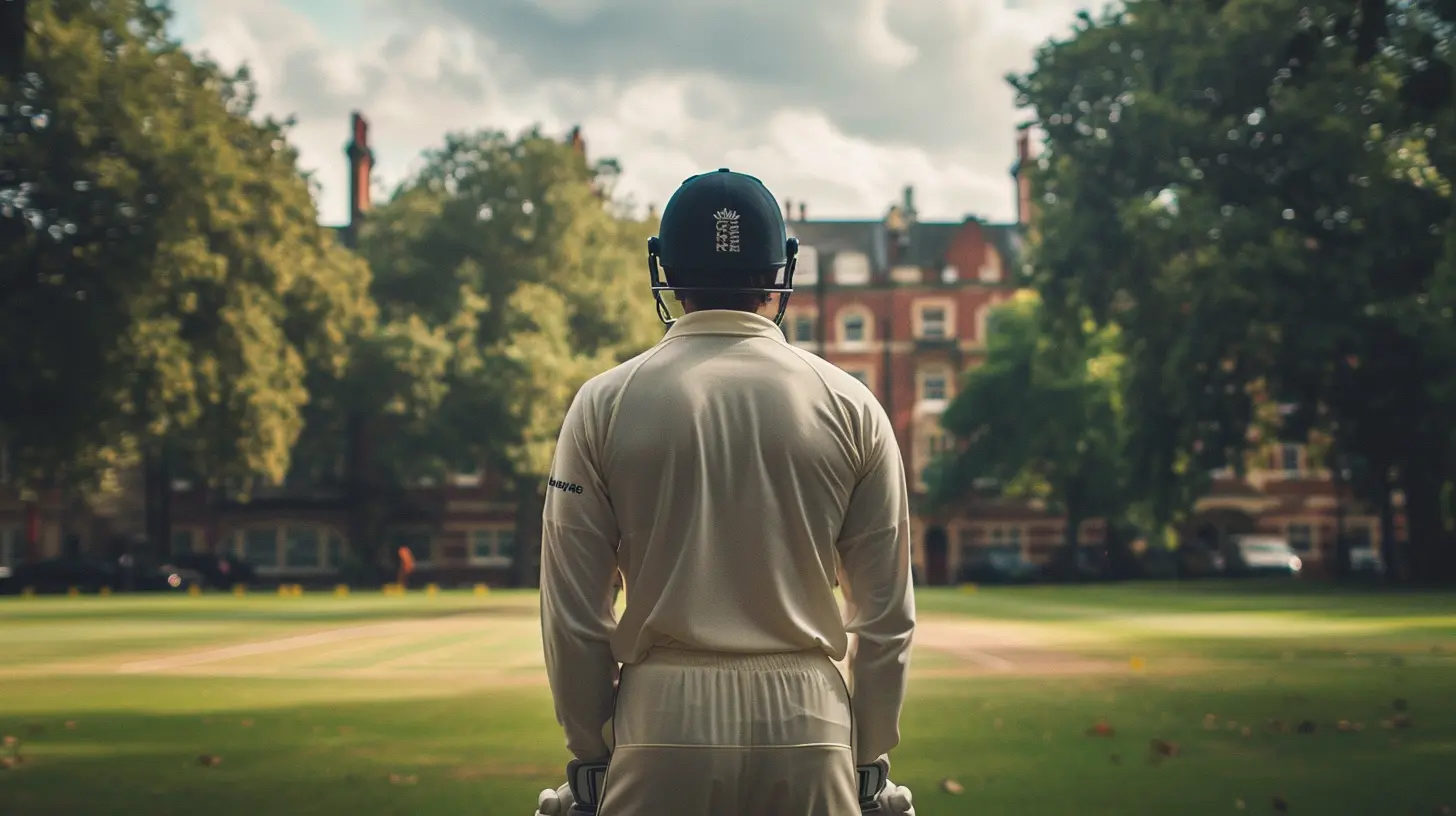The Importance of Mental Health for Cricketers
16 March 2025
When we think of cricket, we often picture the physical aspects of the game — the fast bowling, the powerful batting, and those breathtaking catches. But there’s one massive aspect of cricket that sometimes gets overlooked: mental health. It's the invisible force that drives players to succeed or, sometimes, derails them completely. Just like every other athlete, cricketers face immense pressure, and maintaining mental well-being can be the difference between thriving on the field or burning out.

Mental Health: The Unseen Part of the Game
Cricket is one of the most mentally challenging sports out there. Think about it — long hours on the field, intense concentration, and the weight of an entire nation’s expectations on your shoulders. The mental aspect of the game is just as important, if not more, than the physical. Players need to keep their minds sharp, stay calm under pressure, and bounce back from setbacks.But here’s the thing: for the longest time, the mental health of cricketers wasn't openly discussed. Players were expected to push through, toughen up, and ‘get on with it’. Thankfully, times are changing. More and more cricketers are speaking out about their struggles, making it clear that mental health needs as much attention as any injury or technical flaw.
The Pressure Cricketers Face
Cricket is a sport that demands a high level of concentration and mental resilience. Picture this: You’re a batsman, and you’ve been at the crease for over two hours. The game is hanging in the balance. One small mistake, and your team’s chances could crumble. That kind of pressure isn’t easy to handle. It’s not just the game itself either — media scrutiny, fan expectations, and the fear of failure all add to the mental load.In some cases, this pressure can lead to anxiety, depression, or burnout. But even for those who don’t experience full-blown mental health issues, the strain can still affect their performance. A cricketer’s mind is like a well-oiled machine. If even one cog is out of place, it can throw off the whole system.
Mental Health Issues Among Cricketers
Over the years, several cricketers have opened up about their mental health struggles, breaking the stigma and encouraging others to seek help. Here are just a few examples:1. Marcus Trescothick – The former England opener was one of the first high-profile cricketers to speak openly about his battle with depression. In the middle of his career, he found himself unable to cope with the stress and pressure of international cricket, eventually stepping away from the game.
2. Glenn Maxwell – Known as one of the most explosive batsmen in the world, Maxwell took a break from cricket in 2019 to address his mental health. He admitted feeling overwhelmed and emotionally drained, despite his outward appearance of confidence and success.
3. Virat Kohli – While Kohli hasn’t taken a break from the game, he’s been vocal about the mental challenges he has faced. In interviews, he’s spoken about the immense pressure of leading the Indian team and how he’s had to learn to manage his mental well-being.
These are just a few examples, but they highlight a growing recognition in the cricket world — mental health matters.

The Impact of Mental Health on Performance
It’s simple: when a cricketer’s mental health isn’t in a good place, it affects their performance. A cricketer might be physically fit and technically sound, but if they’re mentally exhausted or struggling with anxiety, it’s going to show on the field.Concentration and Focus
Cricket is a game of patience and concentration. A single lapse in focus can result in a dropped catch, a missed run, or a mistimed shot. Mental fatigue makes it harder to maintain the level of concentration needed to stay sharp throughout a match, especially in longer formats like Test cricket.Decision-Making
Mental health also plays a big role in decision-making on the field. When players are feeling stressed or anxious, they may struggle to make clear, effective decisions. Whether it’s a bowler choosing the right delivery or a captain setting the right field, mental clarity is essential.Confidence and Self-Belief
Confidence is everything in cricket. When players are in a good mental space, they’re more likely to trust their instincts and play with freedom. But when their mental health is suffering, self-doubt can creep in. They may start second-guessing every shot, every ball, and every decision, which in turn affects their performance.
Why Mental Health Support Is Crucial for Cricketers
In a perfect world, cricketers would be able to cope with the pressures of the game with ease. But the reality is, even the best players need support. That’s why mental health support systems are becoming increasingly important in modern cricket.The Role of Sports Psychologists
Many top cricket teams now employ sports psychologists to help players manage the mental demands of the game. These professionals work with players to develop techniques for staying calm under pressure, building resilience, and maintaining focus.Sports psychologists also help cricketers deal with the emotional side of the game — handling failure, coping with criticism, and managing the highs and lows of a cricketing career. It’s not just about improving performance; it’s about ensuring that players are mentally healthy and happy, both on and off the field.
Team Culture and Mental Health
A supportive team culture can make a huge difference when it comes to mental health. When players feel comfortable talking about their struggles and know that they have the backing of their teammates, they’re more likely to seek help when they need it.Captains and coaches play a crucial role in fostering this type of environment. If team leaders prioritize mental health and encourage open conversations, it sets the tone for the rest of the squad. The days of "suffering in silence" should be long gone.

Coping Strategies for Cricketers
So, what can cricketers do to take care of their mental health? Here are a few strategies that can help:1. Mindfulness and Meditation
Mindfulness practices, like meditation, can help cricketers stay present and focused, especially during high-pressure situations. By learning to control their breathing and stay calm, players can prevent their minds from getting overwhelmed.2. Work-Life Balance
It’s easy for cricketers to become consumed by the game, but it’s important to have a life outside of cricket. Spending time with family and friends, pursuing hobbies, and taking breaks from the sport can all help cricketers maintain a healthy work-life balance.3. Talking About It
One of the most important things cricketers can do is talk about their mental health. Whether it’s with a sports psychologist, a coach, or a trusted teammate, opening up about mental health struggles is the first step toward getting help.4. Physical Exercise
Exercise isn’t just good for the body — it’s great for the mind too. Regular physical activity helps reduce stress, improve mood, and boost overall mental well-being. For cricketers, staying physically active can be a great way to manage the mental demands of the game.5. Setting Realistic Goals
Cricketers often put immense pressure on themselves to perform at a high level, which can lead to stress and anxiety. Setting realistic, achievable goals can help players manage this pressure and avoid feeling overwhelmed.The Road Ahead: Breaking the Stigma
While the conversation around mental health in cricket has come a long way, there’s still work to be done. The stigma surrounding mental health issues can make it difficult for players to seek help, especially in a sport where toughness and resilience are valued so highly.But the more cricketers speak out about their experiences, the more the stigma will begin to fade. Mental health is just as important as physical health, and it’s time we started treating it that way.
Cricketers aren’t superhumans — they’re just like the rest of us. They have their good days and their bad days, their triumphs and their struggles. And just like the rest of us, they deserve the support they need to stay mentally healthy.
Conclusion
The importance of mental health for cricketers cannot be overstated. As much as physical fitness and technical skill are crucial to success, the mental side of the game is equally important. By addressing mental health openly and providing the right support systems, the cricketing world can ensure that players not only succeed on the field but also live happy, healthy lives off it.Cricket is a beautiful game, but it’s also a mentally demanding one. And if we want to see cricketers perform at their best, we need to make sure they’re in a good place mentally. After all, a strong mind is a cricketer’s most valuable asset.
all images in this post were generated using AI tools
Category:
CricketAuthor:

Ruben McCloud
Discussion
rate this article
15 comments
Zacharias Robinson
Who knew cricket bats could double as therapy props? Let’s face it, when your mind's an all-rounder, your game shines! Mental health for cricketers is like a good tea break—absolutely essential for keeping the spirits high and the wickets falling!
April 1, 2025 at 6:29 PM

Ruben McCloud
Absolutely! Just like a well-timed tea break, prioritizing mental health is crucial for cricketers to perform at their best. Keeping our minds in shape is key to success on and off the field!
Lys Ramirez
Mental health is key; a strong mind fuels greatness on and off the field!
March 31, 2025 at 11:59 AM

Ruben McCloud
Absolutely! A strong mind is essential for peak performance in cricket and life.
Riven McGuire
Mental health isn't just an afterthought in sports—it's the backbone of performance. Cricketers need to prioritize their mental well-being as fiercely as their physical training. Strong minds lead to strong games. No excuses!
March 29, 2025 at 11:54 AM

Ruben McCloud
Absolutely! Mental health is crucial for peak performance in cricket. Prioritizing mental well-being is essential for both individual success and team dynamics.
Genevieve Lewis
Mind matters as much.
March 27, 2025 at 9:39 PM

Ruben McCloud
Absolutely! Mental health is crucial for peak performance in cricket, as it influences focus, resilience, and overall well-being.
Carson McQuaid
This article highlights a crucial aspect of professional sports often overlooked: mental health. Cricketers face immense pressure, and prioritizing psychological well-being is essential for peak performance and longevity in the game. A must-read for players and fans alike!
March 26, 2025 at 9:01 PM

Ruben McCloud
Thank you for your thoughtful comment! I'm glad you found the article insightful and recognize the importance of mental health in sports.
Katherine McNaughton
Cricket: where the only thing more unpredictable than a googly is a cricketer's mood! Let’s bowl over mental health!
March 26, 2025 at 1:44 PM

Ruben McCloud
Absolutely! Just like in cricket, mental health can be unpredictable, but it's vital for a player’s performance and well-being. Let’s prioritize it!
Mercy Morales
This article highlights a crucial aspect of sports: mental health. Cricketers face immense pressure, and prioritizing mental well-being is essential for peak performance. Supporting mental health fosters resilience, focus, and longevity in their careers.
March 26, 2025 at 4:09 AM

Ruben McCloud
Thank you for your insightful comment! I completely agree—prioritizing mental health is vital for cricketers to achieve their best performance and sustain their careers.
Kristy McManus
Who knew cricket was more than just bats and balls? Turns out, mental health is the real MVP! Keep those noggins healthy, and we'll have fewer 'bouncing' back issues—on and off the field!
March 24, 2025 at 11:18 AM

Ruben McCloud
Absolutely! Mental health is crucial for performance and well-being in cricket. It’s time we prioritize both physical and mental resilience. Thanks for your insightful comment!
April Schultz
This article sheds light on a vital yet often overlooked aspect of sports. It's fascinating how mental health can influence performance and well-being for cricketers. I wonder how these insights might apply to other sports as well. Great read!
March 22, 2025 at 7:51 PM

Ruben McCloud
Thank you for your thoughtful comment! I'm glad you found the article insightful. Mental health is indeed crucial across all sports, and I'm excited to see these discussions expand further.
Veronica Wilkins
Sure, physical fitness is key, but let’s be real: if your mind's a mess, you’ll crack under pressure. Mental health isn’t just important for cricketers; it’s their secret weapon. Game on, but keep that head clear!
March 21, 2025 at 12:55 PM

Ruben McCloud
Absolutely! Mental health is crucial for peak performance in cricket. A clear mind enhances focus, resilience, and overall game strategy. Thank you for highlighting its importance!
Octavia Gilbert
Mental health is crucial for cricketers, impacting performance and resilience. Addressing mental well-being fosters a supportive environment, enhancing both individual and team success.
March 20, 2025 at 8:41 PM

Ruben McCloud
Thank you for your insightful comment! I completely agree—prioritizing mental health is essential for optimizing performance and fostering a positive team dynamic.
Eliana Middleton
This article beautifully highlights a crucial yet often overlooked aspect of sports. Acknowledging the mental health of cricketers not only promotes their well-being but also enhances overall performance. Thank you for shedding light on this important topic!
March 20, 2025 at 1:15 PM

Ruben McCloud
Thank you for your thoughtful comment! I'm glad you found the article valuable in highlighting such an essential aspect of sports.
Aiden Willis
Cricketers need mental health care as much as they need sunscreen! After all, you can’t swing a bat when your mind's stuck in a sticky wicket of worries!
March 20, 2025 at 4:40 AM

Ruben McCloud
Absolutely! Mental health is crucial for performance, just like physical protection. A clear mind enhances focus and resilience on the field. Thank you for highlighting this important aspect!
Paula McCall
Great read! Mental health is key for a happy game!
March 17, 2025 at 9:57 PM

Ruben McCloud
Thank you! I'm glad you enjoyed it. Mental health truly plays a vital role in sports performance and overall well-being.
Amalia Frye
Vital topic! Mental health significantly impacts athletes' performance.
March 17, 2025 at 2:04 PM

Ruben McCloud
Absolutely! Mental health is crucial for athletes, as it directly influences their performance and overall well-being. Thank you for your insight!
MORE POSTS

The Rise of Team-Friendly Contracts in the Age of Superstars

The Psychology of Team Dynamics: What Every Coach Should Know

Virtual Sports Leagues: A New Industry Standard?

The Role of Analytics in Modern Team Sports

Sportsmanship in the Heat of the Moment: Keeping Cool Under Pressure

Using Meditation and Mindfulness to Enhance Sports Performance

From Athlete to Entrepreneur: Success Stories Beyond the Game

The Hidden Dangers of Performance-Enhancing Drugs in Sports

The Art of Staying Composed: Managing Emotions in Competitive Sports

The Business of Player Trades: How Contracts Are Handled